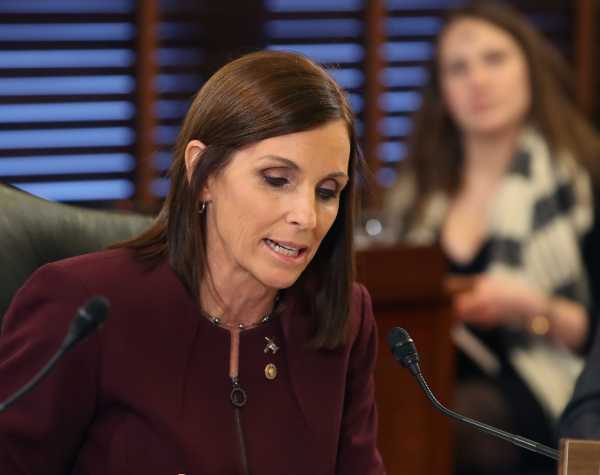
Sen. Martha McSally (R-AZ), a former Air Force pilot who was the first American woman to fly in combat, said that she was sexually assaulted while in the military during a Senate hearing on Wednesday.
McSally said she was “preyed upon and raped by a superior officer” in a prepared statement during a Senate Armed Services subcommittee hearing on sexual assault in the military. She said at first she stayed silent about what happened, but once she came forward, she was “horrified” at how her situation was handled.
“Like many victims, I felt the system was raping me all over again,” she said.
The 26-year veteran said she almost separated from the Air Force but decided to stay in.
“I blamed myself. I was ashamed and confused. I thought I was strong but felt powerless,” McSally said. “The perpetrators abused their position of power in profound ways.”
She said the issue of sexual assault in the military is personal for her from two perspectives, “as a commander who led my airmen into combat, and as a survivor of rape and betrayal.”
“I share the disgust of the failures of the military system and many commanders who failed in their responsibilities,” she said. She called for commanders not to be removed “from the decision-making responsibility of preventing, detecting, and prosecuting military sexual assault.”
McSally did not name her attacker.
This is the first time McSally has shared that she was raped while in the military. In 2018, she told the Wall Street Journal that she was sexually abused by a coach while she was in high school.
Air Force spokesperson Carrie Volpe said in a statement to multiple media outlets that the Air Force is “appalled and deeply sorry” for McSally’s experience and stands behind her and all victims of sexual assault. “We are steadfast in our commitment to eliminate this reprehensible behavior and breach of trust in our ranks,” she said.
Sen. Kirsten Gillibrand (D-NY), the top Democrat on the subcommittee, who has focused on sexual assault in the military while in Congress, said she was “deeply affected” by McSally’s testimony. As the New York Times notes, Gillibrand in 2013 put forth a measure that would have taken sexual assault cases outside the military chain of command and instead let military prosecutors decide which cases to try. It failed, but other changes have been enacted, including ending statutes of limitations on rape cases and making it a crime to retaliate against those who report assault.
Sexual assault is a significant problem in the military. The Defense Department last year said that reports of sexual assault in the military increased by about 10 percent in 2017, with 6,769 reports coming in that year compared to 6,172 the year before. The statistics for 2018 have not yet been released.
McSally’s revelation comes two months after Sen. Joni Ernst (R-IA) said that she was raped by a man she was dating while in college. She said she called a campus sexual assault hotline but did not report the incident to police.
As Vox’s Anna North recently noted, few high-profile Republican women have spoken publicly about their personal experiences with sexual assault and harassment in comparison to Democratic women. In part, the party’s support for some men accused of such behavior — such as now-Supreme Court Justice Brett Kavanaugh, whom both Ernst and McSally supported — makes coming forward complicated for Republican women.
McSally, who lost her Senate race to Sen. Kyrsten Sinema (D-AZ) in 2018 but was appointed to the late Sen. John McCain’s seat by Gov. Doug Ducey, said on the campaign trail last year that she would vote to confirm Kavanaugh. She qualified that her “heart goes out” to Christine Blasey Ford, who accused Kavanaugh of sexually assaulting her in high school, but “we also need fairness where individuals can’t just have one person without any corroboration impact such an important decision.” Ernst backed Kavanaugh as well.
As North wrote, “It’s also the case that Republican voters may be less receptive to candidates’ accounts of sexual misconduct than Democratic voters are. In public opinion polls, Republicans and Democrats differ on how much they see sexual misconduct as a problem.”
But as more women come forward, perhaps attitudes will change.
The news moves fast. Catch up at the end of the day: Subscribe to Today, Explained, Vox’s daily news podcast, or sign up for our evening email newsletter, Vox Sentences.
Sourse: vox.com






